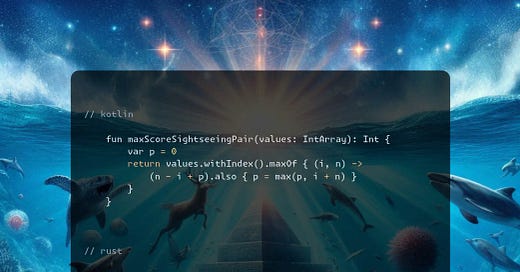# 27.12.2024 [1014. Best Sightseeing Pair]
Max (a[i] + a[j] + i - j), i > j #medium #arithmetics
27.12.2024
1014. Best Sightseeing Pair medium blog post substack youtube deep-dive
Join me on Telegram
Problem TLDR
Max (a[i] + a[j] + i - j), i > j #medium #arithmetics
Intuition
Let's move the pointers and observe:
// 0 1 2 3
// 3 1 2 5
// j
// i 5 - (3 - 0) + 3 = 5 - 3 + 0 + 3
// 5 - (3 - 1) + 1 = 5 - 3 + 1 + 1
// 5 - (3 - 2) + 2 = 5 - 3 + 2 + 2
Each time we move
i, all possible previous sums are decreased by distance of1. By writing downa[i] - (i - j) + a[j]in another way:(a[i] - i) + (a[j] + j)we derive the total sum is independent of the distance, always peek the max ofa[j] + jfrom the previous.Some other things I've considered are: sorting, monotonic stack. But didn't see any good use of them.
Approach
the first previous value can be
0instead ofvalues[0]
Complexity
Time complexity: $$O(n)$$
Space complexity: $$O(1)$$
Code
fun maxScoreSightseeingPair(values: IntArray): Int {
var p = 0
return values.withIndex().maxOf { (i, n) ->
(n - i + p).also { p = max(p, i + n) }
}
}
pub fn max_score_sightseeing_pair(values: Vec<i32>) -> i32 {
let mut p = 0;
values.iter().enumerate().map(|(i, n)| {
let c = n - i as i32 + p; p = p.max(i as i32 + n); c
}).max().unwrap()
}
int maxScoreSightseeingPair(vector<int>& values) {
int res = 0;
for (int i = 0, p = 0; i < values.size(); ++i)
res = max(res, values[i] - i + p), p = max(p, values[i] + i);
return res;
}



